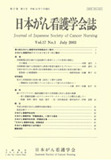Japanese
English
- 販売していません
- Abstract 文献概要
- 参考文献 Reference
- サイト内被引用 Cited by
要 旨
本研究は,長期療養を続ける造血器がん患者が希望を維持していく際に用いる状況解釈のプロセスとその方法を帰納的に明らかにしたものである.大学病院に入院中の造血器がん患者7名に,3ヵ月間で延べ41回の面接調査を行い,その逐語録の内容をエスノグラフィーの手法を用いて分析した.
造血器がん患者が長期にわたる療養生活のなかで希望を維持していくプロセスには,1)先のことが考えられない段階,2)退院後の生活を望む段階,3)現在の状態に慣れる段階,4)ただ良くなりたい段階という4つの段階があった.各段階は,時間の経過というよりも,患者が①具体的目標や②死や③治癒の可能性をどのようにとらえているか,あるいは,患者の④病気と付き合っていく方法がどのような状況にあるかによって,その特徴を示すことができた.つまり各段階にはその段階に応じた状況解釈の特徴があり,彼らの希望はその解釈の方法に大きな影響を受けていた.そして“治療を終えないとどうにもならない”という気付きが各段階から段階への移行を左右した.また,彼らは長期療養生活を続ける過程で,病気と付き合っていく方法を身につけていた.具体的な目標をあえて持とうとせず,死を身近に感じながらも,医療の可能性を深く信じていたのもその一つであった.このような患者の態度を看護師が支持することも,彼らが身に付けた対処能力を侵さないようにするためには必要であることが本研究結果から示唆された.
Abstract
The manner and process, through which patients with hematological cancer under long-term care were able to hold on to hope, were inductively examined. Seven patients who were in a university hospital were interviewed 41 times over a period of 3 months, and the data obtained were analyzed, using an ethnographic approach.
In this process, there were 4 stages : (1) feeling that there is no future ; (2) hoping to resume their lives after discharge ; (3) getting accustomed to current conditions ; and (4) simply wishing to get better. Each stage was characterized by a difference set of attributes, rather than the progress of time. Specifically, the patients expressed the following thought processes at each stage : ① details of a substantial goal, ② interpretation of death and dying, ③ interpretation of effectiveness of cure, and ④ the manner by which they come to terms with their disease. The difference in the attributes at each stage influenced hope held by the patient. The shift to each stage was affected by an acknowledgment of the fact that without treatment there would be no prospects for continued life. They have learned to come to terms with their own diseases during the protracted treatment period. This was exemplified by a process in which they relied solely on the treatment, even though they chose not to set a specific goal upon recovery and even when they instinctively felt an impending doom. This study suggested that it is necessary for a nurse to support a patient's own strategy so as not to weaken his or her coping ability.
Copyright © 2003, Japanese Society of Cancer Nursing All rights reserved.


